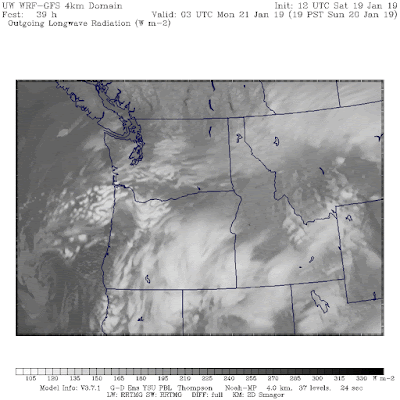There will be a total lunar eclipse on Sunday night that potentially could be quite a sight.
The shadow of the earth will start covering the full moon around 6:36 PM (actually the penumbra, where the light from the sun begins to be reduced). The total lunar eclipse will begin at 8:41 PM and end at 9:43 PM. The eclipse will be over at 11:48 PM.
Total lunar eclipses are not as rare as solar eclipses (typically one can see total lunar eclipses every other year on average), but they can be impressive.
For me the best part is the reddish cast of the eclipsed moon, the result of light be scattered by the earth's atmosphere. As you all know, the sun typically has a reddish cast at sunset, the result of short-wavelength light (like blue and green) being scattered effectively by the atmosphere, while long wavelengths (like red) are scattered less and thus can get through the atmosphere better. Thus, red light can propagate more effectively towards the moon, giving it a reddish hue.
Because of the reddish color, some people call it a blood moon. The first full moon of the season is called a wolf moon, for reason's you will have to talk to a wolf about. And since the moon will be very close during this eclipse, and thus large, it is also called a super moon. Wow...a super, blood wolf total lunar eclipse.
Certainly sounds impressive.
But will you be able to see it?
That is not so clear....but I have some advice for those of you desperate to view it.
The latest UW WRF model forecasts show a weather system going south of us tomorrow night, with rain over Oregon (see 3-h rainfall ending 7 PM Sunday below). If you are in western Oregon, your chances to see the eclipse are very poor.
But to get more insight, let me show you the cloud forecasts by our computer forecat model--actually the total cloud water content in a vertical column. Whiter indicates thicker clouds.
At 7 PM Sunday, there will be a thin veil of clouds (mainly middle to upper level) over the southern two-thirds of WA state. There might be some clear spots over NW Washington and southern BC.
During the next three hours, this thin upper cloud deck moves northward. It may be thin enough in places to see the moon is being eclipsed.
Another approach is to show you a simulation of an infrared weather satellite image based on our computer simulations. Below is one for 7 PM Sunday. Oregon is generally not good for viewing--except for perhaps a break along the coast, but there will be breaks in the clouds over portions of Puget Sound and NW Washington. You have a chance if you are living there.
As in any forecast, we should look at ensembles of many forecast to estimate probabilities, so here is an ensemble of simulated satellite cloud images for 7 PM Sunday (click to enlarge). Most of the simulations show broken clouds over western WA, but some do have have big breaks.
There is a chance those of us near Seattle might see at least part of the eclipse. Traveling to NW Washington will increase your chances of viewing the action. But there will be an element of luck in being in a place where one of the cloud gaps occur.
To paraphrase Clint Eastwood: do you fell lucky?
This blog discusses current weather, weather prediction, climate issues, and current events
Subscribe to:
Post Comments (Atom)
Rainshadow on the Wrong Side of the Olympics
As shown below, the Olympic rainshadow is normally on the northeast side of the Olympics, while heavy precipitation is found on the south an...

-
In act one of this meteorological drama, yesterday and this morning brought heavy rain and flooding to many sections of western Washington. ...
-
The heavy rainfall is over, but some rivers are still rising. The most impactful atmospheric river event of the past few decades. Consider...









Note: You will NOT need eclipse glasses for this one!
ReplyDeleteCan you please write a blog about the warm weather we have experienced this January?
ReplyDeleteWe're watching the eclipse in Sequim. Quite red. Thanks for the heads up.
ReplyDelete